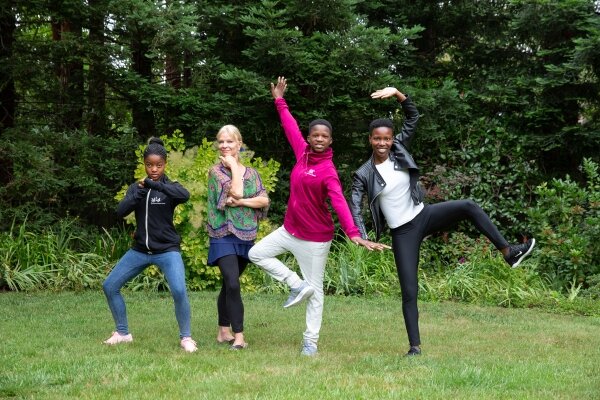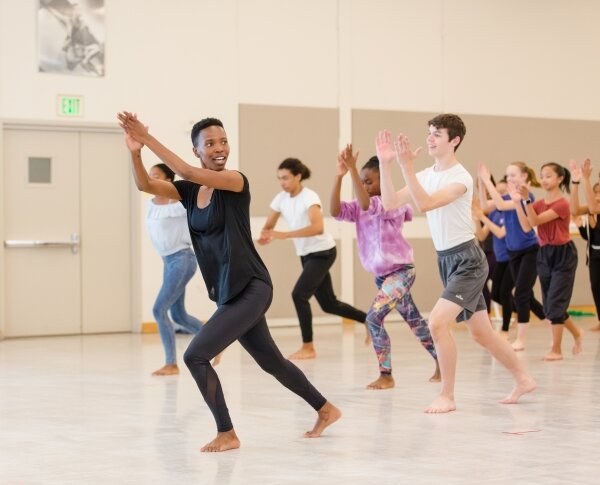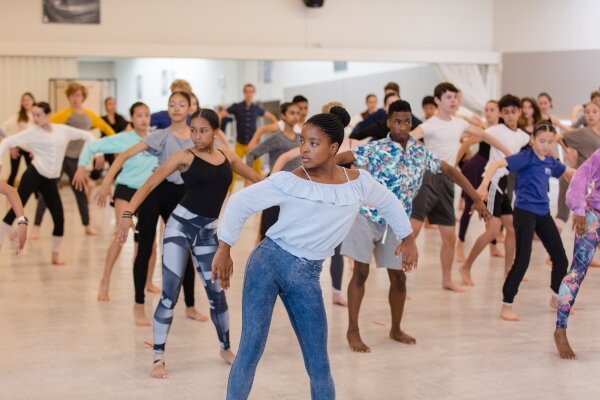A Universal Language
Woodside woman is on a cross-cultural quest to build pride through dance
By Kate Daly
This Article was published in The Almanac
Thanks to one local woman's passion, perseverance, and many professional connections, a "ballerina girl," a "dancer," and an "artiste" – as the three South African visitors call themselves – are having the experience of a lifetime shuttling between Woodside and San Francisco this summer.
During a recent interview at Kristine Elliott's Woodside home, they are sprawled on outdoor furniture, relaxing after spending the day at San Francisco Ballet School and Oberlin Dance Collective.
Linathi Louw, 13, Thimna Ndwa, 15, and Olwethu Katase, 26, wear bright smiles when they talk about their dance classes, and their good fortune in meeting Elliott, a former professional ballerina and current dance teacher and coach who handpicked them to come here to expand their horizons.



This is their first trip outside of their own country, and it's all paid for. Elliott helped the dancers find scholarships, and through a nonprofit she founded three years ago has secured additional funding to cover their transportation, passport, visa, food and lodging costs.
One week in on their four-week stay and the South Africans say they already know they want to return to the United States to continue their education in the future. Coming from crime-ridden townships near Cape Town, they sound exhilarated to be able to walk around and shop without feeling the constant fear of gang violence, kidnappers, rapists and corrupt police. And after worrying about the so-called Day Zero water crisis at home, they are relishing the comparative abundance of water here.
Since 2004, Elliott has worked to promote cultural exchanges with South African dancers. "I was at a point in my life to give back," she said.
The San Mateo native, who also goes by her married name, Schwabacher, started dancing at age 10. At 18 she became a member of the Stuttgart Ballet in Germany, and then went on to become a soloist with the American Ballet Theatre in New York under the direction of a Mikhail Baryshnikov.
The Schwabacher family moved to Woodside in 1992, and when Elliott's twin sons attended Woodside School, she too was in the classroom, attending night school in San Francisco to obtain a bachelor's degree through St. Mary's College Liberal Education for Arts Professionals program.
After that, Elliott helped build up the ballet program at Stanford, where she saw a documentary called "Gugulethu Ballet." The film inspired her to travel with Dance For All to teach ballet to underprivileged children in South African townships.
Her first visit to the township of Gugulethu, outside of Cape Town, took place 14 years ago. Since that visit, she has taught and/or organized cross-training opportunities for professional dancers, choreographers and students in partnership with Stanford, St. Mary's College, foundations, and various dance companies and schools.
The list of partners changes, and now includes support from private donors since she founded the nonprofit Gugulethu Ballet Project three years ago.
Elliott also teaches at Zohar School of Dance in Palo Alto and does project-based work with Menlowe Ballet in Menlo Park, and American Ballet Theatre in Irvine and New York.
In the Xhosa language spoken in South Africa, Gugulethu means "my pride," she explained.
"Ballet is our universal language," Elliott said. "Building pride through dance" is her organization's slogan, and its stated goal is to teach personal discipline, mutual respect, artistic expression, resilience and focus to youth.
Elliott spent the month of March teaching in four different townships, and during that time she chose the dancers for this summer's immersive experience.
This is Elliott's first all-female group. She said that in the past she chose male dancers for diversity reasons, because "we don't have many boys in ballet in America, and black boys are exotic."
So far she has helped bring to this country some 15 male dancers, who have gone on to work in London and Hamburg, or have returned to their homeland to perform, teach and serve as inspirational role models, just as she hoped.
At times Elliott has brought American choreographers and dancers with her to teach in South Africa.
Her organization also offers financial support to some dance programs in South Africa. One example is the community center where Katase volunteers to teach "any kid who wants to become a dancer."
Katase is staying at Elliott's home. Their friendship goes back five years to when they met through Dance For All.
Katase is one of the first recipients of the Thea Anderson Scholarship at Oberlin Dance Collective (ODC), where she is happily bouncing between 20 classes to further her professional development. In one class she explored movement using the Gyrotonic method; on other days she is scheduled to teach at ODC and LINES Dance School.
A graduate of the University of Cape Town, she is currently studying post-grad education, and expressed interest in going to an American university and doing research in South Africa to find out how the arts influence children's academic performances.
Louw is one of Katase's students and the youngest dancer Elliott has brought to the U.S. This is her winter break and she and Ndwa are enjoying the swimming pool and getting to know the kids where they are staying.
Elliott's neighbor, former ballerina Carrie Gaiser Casey, serves on the board of Gugulethu Ballet Project, and opened up her house to the girls.
At San Francisco Ballet School, Louw takes ballet, pointe, character, contemporary, and conditioning classes. "I know almost everything they're teaching, but when they put it together in the center, it's kind of different from what (I) and my dance crew have been doing."
She intends to go back to the center and share the new versions with her fellow students. For her, the center is a haven where she can go several times a week and avoid the dangers of the outside world. She said she would eventually like to go to school in the states, in part to get away from the drug dealers at her present school.
Ndwa said what she's learning at San Francisco Ballet School is the similar to what she learns back home; however, "there are some kinds of styles that are different."
She estimated that she dances about 20 hours a week, and said she would welcome the opportunity to attend a dance academy in the U.S. because she doesn't feel safe at her school. "A kid wanted to stab a teacher ... and the education is poor."
As part of the cultural exchange, Elliott arranged for all three dancers to participate in an educational session at San Francisco Ballet School at the end of June. The two younger girls talked to students about the Gugulethu Ballet Project, and then joined in Katase's lesson on authentic African dancing, with one in the class and the other on drums.


